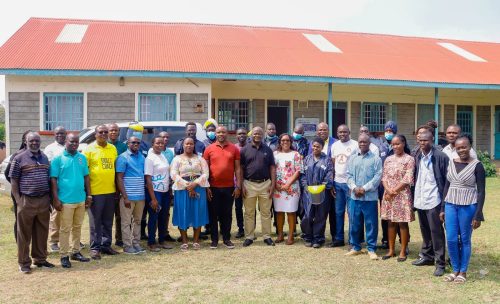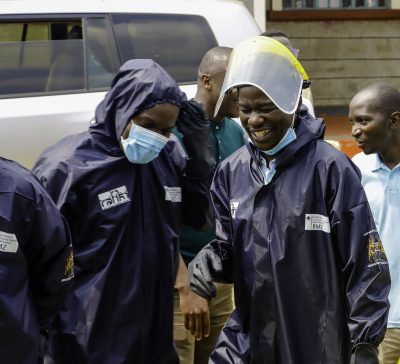
 Siaya County, in partnership with Rafiki Wa Maendeleo, conducts first malaria indoor spraying training at the Ragengni Resource Center in Rarieda Sub-County. The project is an important advance in the fight against malaria in the county, a disease that is still poses a considerable challenge in the region’s health framework. The training, which begun on Wednesday 21 September 2024 and is on day three, is meant to ensure that the community health workers who will be undertaking the indoor residual spraying (IRS) have the necessary skills. Ms. Brenda Owino, a community health assistant working at Manyuanda Health Centre in Rarieda Sub-County, disclosed that the pilot project scheduled to start on September 2, 2024 will entail surveying 7,200 households in eight community health units, including Kagwa Lower, Kokwiri A, Ragengni, Omia Mwalo, Nyabera Lower, Naya Lower, Upper Lieta, and East Katweng’a.
Siaya County, in partnership with Rafiki Wa Maendeleo, conducts first malaria indoor spraying training at the Ragengni Resource Center in Rarieda Sub-County. The project is an important advance in the fight against malaria in the county, a disease that is still poses a considerable challenge in the region’s health framework. The training, which begun on Wednesday 21 September 2024 and is on day three, is meant to ensure that the community health workers who will be undertaking the indoor residual spraying (IRS) have the necessary skills. Ms. Brenda Owino, a community health assistant working at Manyuanda Health Centre in Rarieda Sub-County, disclosed that the pilot project scheduled to start on September 2, 2024 will entail surveying 7,200 households in eight community health units, including Kagwa Lower, Kokwiri A, Ragengni, Omia Mwalo, Nyabera Lower, Naya Lower, Upper Lieta, and East Katweng’a.
While gracing the training, Dr. Omondi Owino, Siaya County Chief Officer for Health, indicated that the county still under heavy burden of communicable diseases. “Our health status is such that we have poor indicators with a number of disease conditions with malaria being the biggest,” said Owino. He indicated that malaria alone accounts for 40% of child deaths within the first five-year-olds and 39% for those older than the five years in the county. He urged for continued investments on health interventions, especially those for health status which most of the children and the community would desire to see improved health outcomes and control of malaria in particular. With regard to malaria prevention interventions, Siaya County has never conducted an indoor residual spraying campaign even though a considerable amount of money had been spent on other interventions including those targeting pregnant women and vector control.
The pilot program is seen as a critical component in reducing the county's malaria prevalence, which currently stands at 29%. The above exercise is not only important in reducing incidence of malaria in Siaya County but most importantly a window of getting more support from both the national government and international partners. Dr Owino said he believed that when the indoor residual spraying will have been successfully carried out together with other integrated vector management strategies, the malaria prevalence rate in the county could be brought down to below 5%.
Moses Ombuoro, the Health Promotion Officer and Community Health Services Focal Person for Rarieda Sub-County, hailed the stakeholders who engaged in the pilot project. He expressed confidence that, given the efforts to achieve the targeted reduction in malaria incidence, more support would be sought from all the agencies to sustain and increase the indoor residual spraying programme in the county. As observed in Ombuoro’s comment, there is consensus amongst the stakeholders to embrace multilateralism in a bid to lower the malaria incidences in Siaya County.
The training of the first cohort of sprayers was coordinated by Henry Anyona, the Rarieda Health Officer of Rafiki Wa Maendeleo. His involvement in the training process has been effective in making sure that the community health workers are fit to undertake the task as required. Ms. Maila Joseck, the Sub-County Malaria Coordinator also graced the training; she emphasised the significance of this effort in the general and particular health-related strategies in Siaya County. The community health workers in conjunction with the county government and Rafiki Wa Maendeleo is a programme that has the potential of replicating the fight against malaria in Siaya County and effectively improve the residents’ heath in the future.
